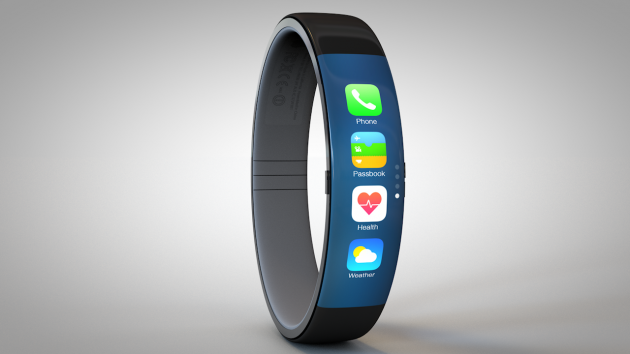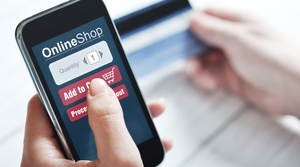Apple's Rumored Medical Device? There's an App for That
March 6, 2014
|
iWatch concept by Todd Hamilton |
Oh, the rumors, the rumors!
Update from March 6: The most recent reports involving Apple suggest that future iPhones would be able to detect when a user is undergoing a medical emergency and can automatically call for help. This is bolstered by an Apple patent granted by the titled "Mobile Emergency Attack and Failsafe Detection." The system could be triggered after the device's accelerometer detects that the phone has undergone a sudden shock. First offering the user the ability to turn the disarm the alert, the phone would utimately trigger an audible alarm to attract attention from anyone who may be nearby if the user does not respond.
The system could also detect automobile accidents or when a user is physically attacked, and automatically call an emergency contact.
Update from February 28: Word broke in late February that Apple is collaborating with Danish hearing-aid company ReSound to make a "made-for-iPhone" hearing aid, that is a cross between a conventional hearing aid and stereo Bluetooth headphones. Known as LiNX, the hearing aid system syncs wirelessly with the most recent Apple
Apple's next operating system, iOS8, may include a host of health-tracking features, including the ability to help users' track weight, pulse, blood pressure, hydration, and blood glucose levels. In addition, the software could track common metrics like steps taken, calories burned, and distance travelled, according to 9to5 Mac. The feature, a pre-installed app known as "Healthbook," is said to be compatible with the iWatch and scheduled for inclusion in iOS8. 9to5 Mac suggests that a sensor-laden iWatch could support health-tracking functionality. The site acknowledges that such features could possibly be withheld for yet another iteration of iOS, if Apple decides they need further revision. The company likely wants to avoid the PR disaster it faced after deciding to include a buggy mapping app in iOS6, jettisoning Google's popular mapping app in the process.
The latest reports suggest that the Cuptertino-based tech giant is opening up Siri to third-party developers, a plan that could further help users track health metrics--possibly including those pulled from the wrist via the company's much-anticipated iWatch.
Samsung is dipping its toes into the health-tracking space as well, and plans on including a heart monitor in its Galaxy S5 smartphone.
In any event, Apple certainly seems to be mulling expanding its involvement in the mobile health industry. Its iPhone 5S includes a chip, the M7, designed to track users' activity levels. When the iPhone 5S debuted, Apple explained that its M7 motion co-processing chip would enable "a new generation of health and fitness apps."
Further evidence of the company's interest in medical devices is supported by the recent hiring of several medical device professionals and a meeting between Apple execs and FDA, which occurred five days before the Google party arrived in Silver Spring, MD. The subject of the meeting was "mobile medical apps," according to FDA's public calendar.
The New York Times also reported in a story by Nick Bilton and Brian X. Chen that one Mark A. McAndrew happened to notice the public-record FDA meeting schedule. The delegation of senior Apple executives had met with FDA's Margaret A. Hamburg, MD, Commissioner of Food and Drugs; Jeff Shuren, MD, director of FDA's Center for Devices and Radiological Health; and Bakul Patel, who is said to have drafted FDA's guidance on mobile medical apps.
The Apple delegates included Jeff Williams, senior vice president of operations; Bud Tribble, vice president of software technology; and Tim Powderly, an attorney in Apple's government affairs department. Also at the meeting was recent Apple hire Michael O'Reilly, MD, former executive vice president for medical affairs and chief medical officer of Masimo Corp (Irvine, CA). Masimo makes a pulse monitor called the iSp02 that uses sensors to track the wearer's pulse and other data and sends the information to an iPhone app, among other devices.
McAndrew is a partner with the law firm Taft Stettinius & Hollister, which works with health and science clients. He told Bilton and Chen in a phone interview that, "They are either trying to get the lay of the land for regulatory pathways with medical devices and apps and this was an initial meeting," McAndrew said, "or Apple has been trying to push something through the FDA for a while and they've had hangups."
This all ties in very neatly with the rumors that Apple is planning to include glucose monitoring along with other health and fitness data in its much anticipated (and speculated about) iWatch, which is said to have a planned release date later this year.
According to 9to5Mac's Mark Gurman, Apple intends to include with iOS8 a preinstalled app called Healthbook. Gurman wrote, "The software will be capable of monitoring and storing fitness statistics such as steps taken, calories burned, and miles walked. Furthermore, the app will have the ability to manage and track weight loss. (Healthbook) will be a pre-installed challenger to offerings such as those from Nike and Fitbit, making it all the more intriguing that Apple CEO Tim Cook still sits on Nike's board of directors."
But Apple being Apple, they have to up the ante. Therefore, that is the reason the so-called Healthbook won't be just another "me-too" offering for the gym crowd but will also be able to track health metrics ranging from blood pressure to blood-related data points, such as glucose levels. Hence, possibly, the FDA meeting, since this is territory requiring FDA approval to take to market.
Apple-watcher websites are full of buzz about who's been hired away from whom. Gurman wrote about the headhunting last July and, more recently, Qmed updated the roster.
Still more recently, former Nike advisor Jay Blahnik and Todd Whitehurst, MD, formerly vice president of product development at Senseonics (Gerrmantown, MD), joined the Apple team. And Jordan Khan reported, also on 9to5Mac, that Apple has hired Roy J.E.M Raymann, an expert on sleep research, from Philips Research. Raymann has extensive experience in wearables, sensors, and non-pharmacological methods of improving sleep quality, Khan says.
In any event, not everyone is wholly optimistic about the notion of Apple products being used to improve healthcare. "As a hands-on healthcare practitioner, I can tell you, this will not reduce costs," says Michael McCarthy, MBA, BS, RRT-NPS, a respiratory therapist at Sourasky Medical Center in a LinkedIn thread summarized on Qmed. "It will probably improve care but you still need people to take care of patients. Data is only as good as the quality and interpretation of that data. I can put a pulse oximeter in a watch and broadcast it to China but if someone qualified is not there to make sure there is no aritifact to disrupt the signal then the data is useless and possibly harmful if misapplied. And this is only one very small, routine application in the healthcare arena." He concludes: "Thanks for the gadgets. They're real nice."
About the Author(s)
You May Also Like



